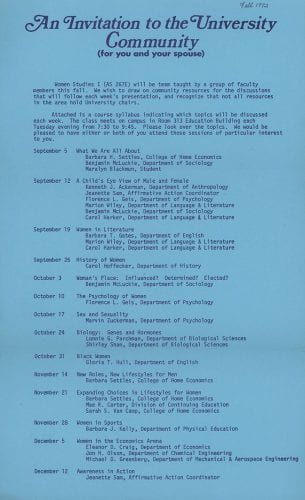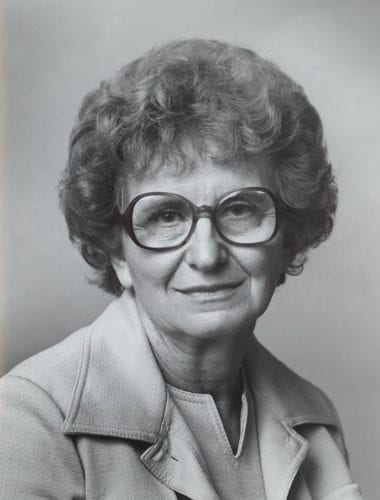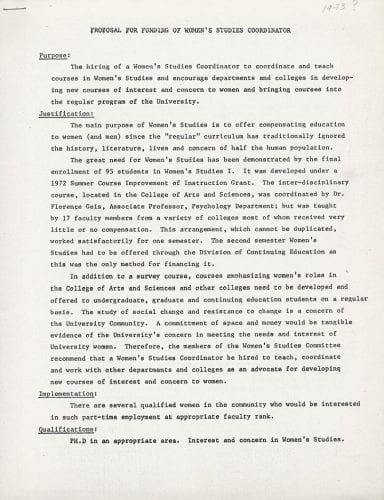During the late 1960s, the University of Delaware entered a period of important change. The spirit of social unrest that was sweeping the nation came to Newark, bringing with it movements to create equality for those at the margins of American life.

Announcement for the first Women’s Studies course, offered in the Fall 1972.
As change swept student life in the University, the disparity between men’s and women’s academic experiences became clearer for both students and faculty. Female students were clustered in disciplines traditionally considered appropriate for women. The low number of female faculty at the University influenced this situation, as women students lacked strong female role models in many fields. Both female students and members of the faculty began to work for change to the campus situation.

Mae Carter
In 1969, President E. Arthur Trabant created an Advisory Committee on Policies, Programs, and Services Affecting Women Students, Faculty and Staff. The report that they produced, known as the Colburn Report after committee chairperson Professor Nancy Colburn, called for an end to hiring discrimination and the addition of female faculty at all levels, as well as the hiring of women into administrative positions.
The committee also created an offshoot group to coordinate the introduction of women’s studies courses and research projects. This new committee was made up of young faculty members and chaired by Mae Carter. Carter had been hired in the late 1960s by the Division of University Extension (now Professional and Continuing Studies) as a counselor to assist women returning to college. A lifelong activist, Carter’s passion for assisting women in accessing the educational opportunities that they deserved and to study and work on an equal playing field with men at the University would make her one of the most influential women in the University’s history.
This new advisory committee sought to create a team-taught women’s studies course and to determine how women’s studies might become a permanent component of the curriculum. In fall 1972, a group of nineteen faculty members presented the University of Delaware’s first Women’s Studies course. The flyer shown at the beginning of this post was sent to members of the campus community to advertise the course. Faculty members involved in this project, many of whom were early-career and untenured, taught the class with little or no additional compensation.
The initial women’s studies offering proved very popular, but to make women’s studies a lasting part of the University curriculum, there was need for permanent leadership and a budget to support programs. Mae Carter, Women’s Studies Committee chairperson, worked hard to establish the program within the College of Arts and Sciences. In 1973, the Women’s Studies Interdisciplinary Program was formalized, and a Coordinator of Women’s Studies position created. The first two program directors were hired from outside the University, and had short tenures, but Mae Carter and a devoted group of faculty, including Margaret Andersen, Kate Conway-Turner, Bonnie Scott, Barbara Gates, Gloria Hull and Sandra Harding, maintained and promoted the program. The program would grow to support a minor, then a major in Women’s Studies, as well as advancing scholarship around women’s lives, histories, and concerns throughout the university. In 2023, the Department of Women and Gender Studies celebrates its 50th anniversary.

Proposal for a Women’s Studies Program Coordinator, 1973.

